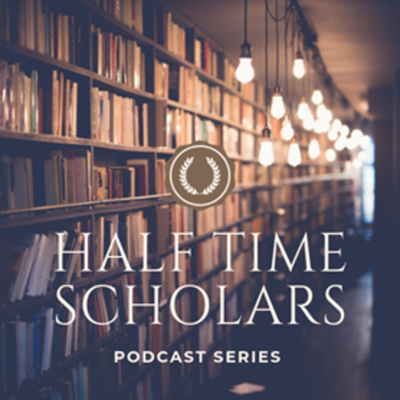
Halftime Scholars
By Suren Ladd
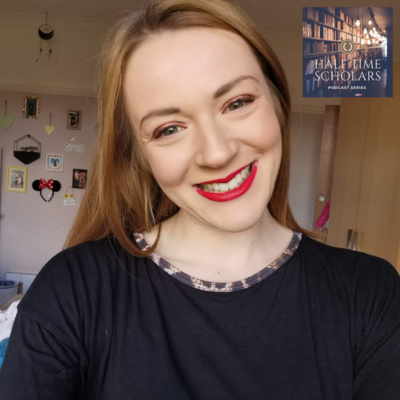
Halftime Scholars Mar 07, 2021

Half Time Scholars - Beyond Boarding: Understanding Social Interactions in Cabin Crew Training
Maria F. Larrea is a PhD candidate at Griffith University in Australia with extensive practical experience in aviation training, hospitality, and higher education, which underpins her research endeavours. She is interested in exploring the learning process and competence development in service-sector jobs, with a particular focus on the aviation and hospitality sectors.
Maria's doctoral project offers a holistic perspective on learning beyond formal training to enhance the competence of cabin crew members. She contends that their learning process transcends structured curricula as it evolves through the friction and negotiations of knowledge, values, and identity fostered in formal training and situated in work practice. This dynamic process sees cabin crew members consistently mediating their performance in routine and unexpected situations, shaping their professional competence and identity.
Central to Maria's research is the recognition that social interactions, beyond technical skills, play a pivotal role in shaping cabin crew competence. Her study aims to make empirical contributions by offering insights into these social dynamics during training and at work, providing airlines with a more comprehensive understanding of cabin crew learning experiences from an insider's perspective. Ultimately, Maria's work aims to assist airlines in improving cabin crew performance and fostering positive attitudes toward their roles as safety compliance enforcers and service providers.
Please follow Maria's work on LinkedIn linkedin.com/in/maria-larrea-544a5765

Half Time Scholars - Beyond the Blackboard:School Leaders in a Consumer-Driven Culture
Welcome to this episode of Half Time Scholars. In this episode, we're joined by Carolyn Wade, an Educational Leader with over twenty years of experience in curriculum design and school-community partnerships. Carolyn began her career in primary education before advancing to senior leadership roles.
Recently, she embarked on a research project during a 12-month sabbatical to explore the impact of parent engagement on school leadership, culminating in her MEPSR study presented at education conferences from the Gold Coast to Toronto. Now pursuing a PhD at Griffith University, Carolyn is focused on enhancing educational practices and the relationship between schools and families.
We'll dive into Carolyn's research, examining how school leaders navigate parent engagement in a culture of increased consumerism. Her work, based on interviews with school leaders, highlights the spectrum of impacts that parent engagement can have, from minimal to significant pressures on school administration. Carolyn will share insights on how these dynamics could inform changes in school leader development and parent engagement strategies.
Expect a discussion that merges academic rigor with practical insights, offering valuable perspectives for educators, parents, and policymakers interested in the future of educational leadership and collaboration.
#EducationLeadership #ParentEngagement #SchoolCommunityPartnership #AcademicInsights #EducationalResearch

Half Time Scholars - Farianas and Maoists: Stories of Female Ex-Combatants in Post-Peace Societal Transitions
Priscyll Anctil Avoine is an Associate Senior Lecturer at the Department of War Studies at the Swedish Defence University, specializing in Feminist Security Studies. Holding a Ph.D. in Political Science and Feminist Studies from the Université du Québec à Montréal (Canada), she was a Vinnova/Marie Curie/SSHRC postdoctoral fellow at Lund University’s Department of Political Science (Sweden). Actively engaged with the Fundación Lüvo collective (Colombia, Canada), she contributes to feminist and anti-racist projects, including the publication of Revista Lüvo.
Her research, spanning over a decade, concentrates on embodied and emotional processes in contemporary wars, with a focus on the post-disarmament militancy of women ex-combatants. Her recent work delves into the political militancy of women ex-combatants in Nepal and Colombia, exploring leftist armed struggles' aftermath. Situated at the intersection of War and Gender Studies within Feminist International Relations, she has published extensively in prestigious journals and edited volumes, collaborating on interdisciplinary projects nationally and internationally.
Priscyll's expertise extends to teaching and supervision, having designed innovative curricula in Gender Studies, Philosophy for Peace, International Relations, and Feminist Philosophy. With over 2500 hours of teaching experience in Colombia, Canada, and Sweden, she welcomes student research in International Relations, particularly in Feminist Security Studies, war, DDR, leftist insurgencies, and Colombian politics. Fluent in Spanish, English, and French, she has lectured at various universities globally.
For more information on her work, visit https://priscyllanctil.com/about/.

Half Time Scholars : Platforms, policy and principals: Exploring data technologies in educational leadership.
On this epsiode we speak with Sarah Langman is a Ph.D. candidate at the Institute for Learning Sciences and Teacher Education at Australian Catholic University in Melbourne Australia. Prior to academia, she worked as a primary school teacher and leader in regional Victorian government schools, and holds a MEd in Educational Leadership and Management.
Sarah’s Ph.D. project examines datafication in spaces of educational leadership, with a specific focus on the digital data techniques and technologies utilised by those in positions of leadership. Her research uses poststructuralist theory, particularly assemblage theory (Deleuze & Guattari, 1987), to critically explore the logics that shape the policy landscape in Australian education as a result of the processes of data infrastructuring. She investigates digital data platforms deployed by the departments of education in the Australian states of Victoria and New South Wales and the role they play in reconfiguring school leadership, critically considering how datafication has created new possibilities for thinking and practising school leadership.

Half Time Scholars - Unlocking Language Fluency: Plurilingual Pedagogies in Action
With extensive teaching experience in Lebanon, the United Arab Emirates, and Canada, Lana has gained valuable insights into diverse educational contexts. These experiences have shaped her understanding of the challenges and opportunities in language education. Currently, she is a lecturer in the B.Ed. TESL program at McGill University and the B.Ed. TESL and FSL programs at Université du Québec à Montréal (UQÀM).
Lana's dedication to academic excellence is evident through her numerous publications, active participation in conferences, and involvement in service roles. Notably, she serves as a member of the organizing team of the GradTalks at DISE and as a social media strategist for ACLA/CAAL. Follow Lana's work on Twitter (X) @ZeaiterLana9

Half Time Scholars - Balancing Boundaries: Examining Free Speech in Higher Education
Nora has also served as an editorial assistant for two scholarly journals including the Journal of College and University Law under the editorship of Dr. Ray Solomon (2018-2020) and Dr. Barbara A. Lee (2020-Present). Follow Nora's work on Twitter @noraannedevlin, and @ noradevlin.com/

Half Time Scholars - Navigating Indigenous Laws and Ecological Governance
Priscylla Joca, a Postdoctoral Fellow in Law at the University of Toronto, is deeply engaged in researching Indigenous Laws and Ecological Governance. Her academic journey includes a Doctorate in Law from the Université de Montréal and a Master's in Constitutional Law from the Federal University of Ceara, Brazil. As a lecturer at both the Université de Montréal and the École d’études autochtones, Université du Québec en Abitibi-Témiscamingue (UQAT), Priscylla's expertise spans Indigenous Laws, International Indigenous Rights, Human Rights, Climate Justice, Environmental Justice, and more. Her work centers on the complexities of implementing autonomous consultation and consent protocols by Indigenous, Afro-descendant, and traditional communities for Free, Prior, and Informed Consent (FPIC). Through documentary analyses of diverse protocols from the Americas and an exploration of the protocols' recognition within the international human rights system, she reveals crucial insights. Her research reflects on the legal-political challenges of implementing FPIC and highlights the importance of recognizing communities' autonomy in determining consultation frameworks and guidelines. Ultimately, Priscylla's work underscores the potential of these protocols to implement FPIC while respecting the rights and cosmopolitics of the communities that authored them

Half Time Scholars - Rural Renaissance: Igniting Entrepreneurial Ecosystems for Local Development
Our guest today is João Almeida, a researcher and entrepreneur dedicated to exploring the intersection of entrepreneurship, innovation, and rural development. João holds a BA degree in Languages and Business Relations, an MSc. in Management, and is currently a PhD candidate in Business and Economics at the University of Aveiro. He is also a research fellow at the Research Unit in Governance, Competitiveness and Public Policy (GOVCOPP).
João's research focuses on entrepreneurship education, entrepreneurial ecosystems, and the role of innovation in rural areas. He strongly believes in the untapped potential of rural and low-density territories to address the world's challenges while offering unique opportunities for entrepreneurship and innovation.
In today's episode, João will share insights from his PhD research, which aims to shed light on the creation and development of Entrepreneurial Ecosystems (EEs) in low-density territories, with a particular focus on Portugal. Join us as we explore the motivations, drivers, and barriers behind the emergence of EEs in these areas and uncover strategies to promote sustainable local development. Follow João's work on Twitter @joao_mlalmeida

Half Time Scholars - Forgotten Histories: Uncovering the roots of intolerance in Sri Lanka
In this episode, we shine a spotlight on Dr. Shamara Wettimuny, a distinguished historian and specialist in ethno-religious conflict and discrimination, in Sri Lanka. Dr. Wettimuny's extensive research and unique perspective have shed new light on the 1915 anti-Moor pogrom, a pivotal episode in Ceylon's history.
With a background in International Relations and History from the London School of Economics, as well as a D.Phil from the University of Oxford, Dr. Wettimuny possesses a wealth of knowledge and academic expertise. As a Beit Scholar, she has honed her understanding of identity formation across majority and minority communities in Sri Lanka, focusing on the Sinhalese and Moor populations.
In her thesis, Dr. Wettimuny critically examines the roots of ethno-religious violence, drawing attention to the role of colonial policies and discourse that exacerbated tensions between the Sinhalese and Moors. By re-evaluating existing historiography and popular narratives surrounding the pogrom, she offers a fresh perspective on the outbreak, spread, and aftermath of this tragic event.
Moreover, Dr. Wettimuny's research unearths a comprehensive history of ethno-religious violence, exploring the complex interplay between indigenous practices, colonial legislation, and global influences. Through her meticulous analysis of religious, economic, and social spheres, she illuminates the evolution of ethnic and religious identities in Sri Lanka from the mid-nineteenth century onward.
As the Lead Researcher for the Minor Matters' Virtual Museum on Religious Freedom in Sri Lanka, Dr. Wettimuny not only unearths hidden narratives but also advises Sri Lankan and international organizations on countering hate speech and disinformation targeting minority communities.
Follow Shamara's interesting work @shamara4w on Twitter.

Half Time Scholars - Exploring the Rise of Non-Human and Virtual Influencers in Tourism Marketing
Welcome to Half Time Scholars, the podcast series that features the interesting work of independent and emerging researchers, who share their research, interests, and experiences. In this episode, we are joined by Li Xie-Carson, a PhD candidate at The University of Queensland Business School in Australia. Li's current research focuses on non-human influencer, virtual influencer, and influencer marketing in tourism. With over eight years of experience in the tourism and hospitality industry, Li brings a unique perspective to her research.
During her PhD, Li has been actively engaged in research, receiving numerous awards, including the Best Graduate 3-Minute Thesis Award at TTRA 2021 and the Best Poster Award at CAUTHE 2023. She is also open to research and teaching opportunities within and across disciplines when she graduates.
In this episode, Li will discuss her research on non-human influencers and virtual influencers, the challenges and opportunities of influencer marketing in the tourism industry, and her experience in both industry and academia.

Half Time Scholars - Digitalisation and Circular Economy: A Path to Sustainable Development
Welcome to this episode of Half Time Scholars, where we delve into the world of circular economy and digitalisation with PhD candidate Agnes Toth-Peter. Joining us from the Queensland University of Technology in Brisbane, Australia, Agnes is a recipient of the QUT Postgraduate Research Award scholarship and is a part of the QUT ACE Centre and the QUT Centre for a Waste-Free World.
In this episode, Agnes shares her expertise on the link between digitalisation and circular economy, highlighting potential solutions for sustainable development through new business models. Specifically, she discusses the benefits and opportunities of Industry 4.0 tools and how digital technologies can support the implementation of circular economy principles, enabling a shift towards more sustainable production and consumption patterns.
With a background in systems thinking and system dynamics, Agnes believes that the solution to any complex problem starts with a shift in our mindset and mental models. Prior to her Ph.D. studies, Agnes completed her undergraduate studies in London, Paris, and Valencia, and a Master of Business at the University of Queensland, where she received the Dean's Honour Roll Award for Innovation & Entrepreneurship and Social Impact & Sustainability.
Tune in to gain insights from Agnes Toth-Peter on how circular economy and digitalisation can contribute to sustainable development and the shift towards more sustainable production and consumption patterns.

Half Time Scholars - Cultural Considerations in Managing PCOS: The Role of Ayurveda and Yoga
Vibhuti Rao, a PhD candidate from Western Sydney University, is researching Polycystic Ovary Syndrome (PCOS), a complex disorder affecting Indian women. She's exploring the potential of Ayurvedic diet and yoga therapy to manage the condition and provide alternative, sustainable, and effective lifestyle options. Her study focuses on assessing the feasibility, acceptability, and safety of a standard Ayurvedic lifestyle program for overweight/obese ethnic Indian women with PCOS. PCOS has no cure and there is a need for alternative, sustainable, and effective lifestyle options. Lifestyle modification is the first-line treatment of PCOS, however has limited research.
Ayurveda and yoga are traditional medicinal systems originated in Indian sub-continent, are now popular worldwide for their effect in managing various chronic and lifestyle-related. A lifestyle program constituting the Ayurvedic diet and yoga therapy (AY) based on Ayurvedic principles may help reduce weight and improve metabolic and reproductive outcomes in women with PCOS.
This exploratory, sequential and mixed-method study will be conducted in Australia and India, aiming to present a standard AY lifestyle program and assess its feasibility, acceptability, and safety in ethnic Indian women with PCOS who are overweight/obese. This study will include a randomised feasibility trial of over 12-weeks. Follow Vibhuti's interesting work on twitter @drvibhutirao

Half Time Scholars - Eyeing the Future: The Impact of Eye Tracking on Adaptive Retail Pricing

Half Time Scholars: Determining the neuro-cognitive changes in heart patients put on statins to improve cardiovascular health
Rubina Mulchandani is a graduate in Life Sciences and post graduate in Clinical Research, currently a PhD scholar in Clinical Research at the Indian Institute of Public Health, Public Health Foundation of India. Her research area is interdisciplinary and combines the fields of cardiovascular epidemiology and pharmacovigilance. Rubina is actively involved in teaching post graduate students and health professionals in the ongoing academic programmes and short-term training at the institute.
Cardiovascular diseases (CVDs) are responsible for a third of all global deaths a majority of which occur due to heart attacks and stroke. About 80% of these deaths occur in the developing countries, with mortality being the highest for the low- middle income countries.
Rubina’s research includes establishing a cohort to assess the neuro-cognitive changes among statin users over time. This is a longitudinal study where adults prescribed statins for dyslipidaemia in the last 1 year have been recruited from the Cardiology Out Patient Department of the study hospital. Her study hopes to add to the knowledge pool for this under-researched area of study in Asians, hopefully shedding light on the statin safety profile. This could help generate new hypotheses and provide a leeway for larger studies, with the ultimate aim of enhancing patient care. Please follow Rubina’s interesting work on Twitter @Rubina_BigB_EF

Half Time Scholars - How media contributes to the silencing and stereotyping of marginalized groups
On this episode we speak with Isabella Gonçalves, a Brazilian second-year doctoral candidate at Johannes Gutenberg University Mainz, Germany, and a recipient of a DAAD Scholarship. Isabella currently researches the stereotypical framing of migrants and refugees in media coverage comparing Brazil and the United Kingdom (UK). Isabella is also the head of the Brazilian team on the Digiworld scientific network.
Isabella’s interests focus on the interactions between ingroups and outgroups, media framing of marginalized groups, political communication, and comparative approaches, including countries from the Global South and Global North. Follow Isabella’s interesting work on Twitter @bellasgon and https://www.igoncalves.com/homepage

Half Time Scholars - Engineering Employee Welfare
Enas Aref is a board-certified Ergonomist, researcher and instructor with experience in the areas of Ergonomics, Occupational Safety, Human Factors, Usability, Statistics Product Design, and Project Management. An Ergonomist designs or modifies the work to fit the worker, not the other way around.

Half Time Scholars – The Rise of Deepfakes: A new hope or a phantom menace
Lucas Whittaker is a PhD Candidate at the Centre for Behavioural Economics, Society and Technology (BEST Centre) at the Queensland University of Technology. His research focuses on the application of synthetic media such as ‘deepfakes’ within marketing contexts and psychological factors which may influence consumer appraisal of such media.
Recent advances in artificial intelligence and machine learning have given rise to the deepfake, a method of creating highly realistic yet inauthentic digital audio, images, and videos. For marketers, deepfakes present new opportunities for customer value creation and engagement, but factors such as the level of realism inherent in the media and the presence of disclosure may influence consumer appraisal. Cognitive biases and predispositions to modes of information processing may also influence how deepfakes are perceived. Lucas’ PhD conceptually and empirically explores such factors pertaining to deepfakes and the wider implications of such synthetic media for marketing.
Please follow the Lucas's interesting work on Twitter@LucasWhittaker

Half Time Scholars - Creating Majoritarian National Identity through a Regional Lens
Dr. Pradyumna Jairam’s research is placed within the broader domain of how the Hindu nationalist Bharatiya Janata Party constructs its idea of Indian history through an identity-centric rubric. Using history textbooks, the party prescribed in the north-western state of Rajasthan in 2017. His research uncovers how in order to branch out its national ideology of Hindutva to suit a regional context, the party regionalises the history of the nation, in order to satisfy a state-oriented narrative.
Dr. Pradyumna Jairam completed his PhD in Politics and Education from King’s College, London in 2022. His research examines how the Bharatiya Janata Party constructs a particular narrative of Indian Identity, centred around Hindu majoritarianism in the school history textbooks of Rajasthan. He is at present a Teaching Fellow at the Department of Politics, School of Oriental and African Studies, London. He is also a yearly Visiting Lecturer at City, University of London. He was a Graduate Teaching Assistant at the Department of War Studies, King’s College from 2017 to 2021, and prior to his PhD was a school history and political science teacher in New Delhi, India from 2012 to 2016.

Half Time Scholars - Understanding the social and economic impact of Incubators and Accelerators
It is estimated that more than 7000 incubators exist across the globe. Both governments and the private sector are increasingly using incubators as an entrepreneurship development tool for economic and social development, both at a regional and national level.
A tool able to solve both social and business challenges with a dynamic approach. Hence, notwithstanding the growth of research in this domain since the early efforts to provide frameworks that link business incubation with the incubated development process, there is still a need to understand ‘how’ and ‘why’ incubated firms grow in a business incubator environment. Massimiliano's research aims to address these shortcomings, with a particular focus on the social related aspects, that see incubators as one of the main instruments to address and solve impelling social challenges, as they have a positive impact on the development of social start-ups, and they increase their possibility of surviving and of scaling their business. Follow Massimiliano's interesting work @

Half Time Scholars- Nation building: The role of education in states emerging from conflict.

Half Time Scholars - Entrepreneurial Spirit: Supporting the next generation of start-ups to solve global issues
On this episode we speak with Giuliano Sansone who holds a PhD in Management from Politecnico di Torino. He has been visiting Ph.D. Student at the MIT Sloan School of Management under the supervision of Fiona Murray in 2018. Broadly, Guiliano's work focuses on working on Entrepreneurship in three distinct areas:
1. Organizations that support the creation and the development of startups (e.g., Incubators, Accelerators, Startup Studios, Science Parks, etc)
2. Social entrepreneurship (e.g., for-profit organizations with strong positive social/environmental aims)
3. Entrepreneurship education and student entrepreneurship.
Currently, Guiliano is a post-doc researcher at Prague University of Economics and Business in the Department of Entrepreneurship under the supervision of Martin Lukeš. Giuliano’s research is dedicated to entrepreneurial creation and development and social entrepreneurship. His research was published in international journals such as Technological Forecasting and Social Change and International Entrepreneurship. His research was presented at more than 10 international conferences such as R&D, IPDMC and CINet. Giuliano also worked for the European+ project named Entrepreneurship Education Ecosystems in Engineering and Technology (E4T) and he is working for an international research team named Social Innovation Monitor (SIM).
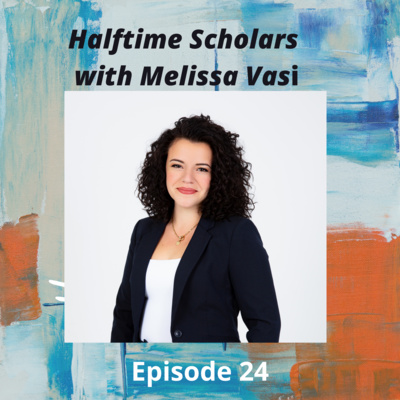
Halftime Scholars - Open innovation and Dynamic capabilities: Supporting small and medium-sized enterprises to better prepare, navigate and recover from economic crises.
Melissa Vasi is a doctoral candidate in Business Administration at Uninettuno University under the supervision of Prof. Dr. Vincent English.
Her research focuses on the influence of open innovation and dynamic capabilities on the resilience of small and medium-sized enterprises during the COVID-19 pandemic. The study involves the implementation of a practical framework that supports firms in preparing for, during and recovering from an economic crisis caused by exogenous factors like pandemics, climate emergency, trade wars.
Melissa received her B.Sc. in Computer Science in 2015 from University of Milano-Bicocca with a thesis on IT architectures that enable marketing communications and CRM development. She obtained her MBA in Business Administration and Digital Technologies (summa cum laude) in 2020 from Uninettuno University with a thesis on digital innovations and business models applied to insurance processes. Please follow Melissa’s interesting work on Twitter: @melissavasi or visit her website Website: www.melissavasi.com

Half Time Scholars: Attacks on education as a potential driver of migration during times of conflict
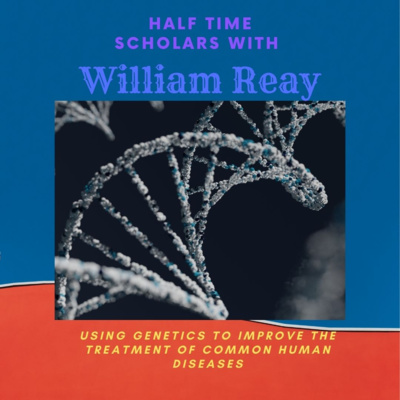
Half Time Scholars - Using genetics to improve the treatment of common human diseases
William is particularly passionate about the application of this approach to psychiatry, as novel interventions remain urgently required to improve patient outcomes. His research has thus far been published in prestigious journals including Molecular Psychiatry and Brain, Behaviour, and Immunity and presented at conferences including the World Congress of Psychiatric Genetics and Schizophrenia International Research Society. Follow William’s interesting work on Twitter @williamreay96

Halftime Scholars - Optimal Deployment: The Race for Artificial Intelligence Supremacy
On this episode we explore how recently, governments have shown significant interest in disruptive technologies such as artificial intelligence (AI). For example, recently launched national strategic AI plans. However, AI adoption in the public sector is an emerging trend, hence, there is enormous ambiguity about the optimal deployment.
Our guest is Samar Fatima is a Ph.D. scholar in the Queensland University of Technology Business School. Her research interest focuses on exploring the role of artificial intelligence in the public sector. Through her research, she aspires to explain the role of technology in societal development initiatives. The first study identifies what approach each country is adopting towards AI through national strategic plans. The second study explores why the countries approached AI in a certain way. The third study focuses on how public agencies develop the readiness to design and deliver AI-enabled public services. The third study presents renovation in business models of public agencies for such disruptive transformation.
By using a combination of data sources (primary and secondary) and employing a set of methodologies such as content analysis, fuzzy-set qualitative comparative analysis and design science research methodology, the dissertation covers a variety of theoretical and empirical avenues. The dissertation answers the what, why and how affairs of AI in countries. Besides extending knowledge on strategic planning of governments, the dissertation sheds light on various societal (e.g. ethics) and practical (policy implication) issues related to AI adoption and anticipates future of AI in countries. Follow Samar’s interesting work @ Twitter: https://twitter.com/samarfhatimaand LinkedIn: https://www.linkedin.com/in/samar-fatima
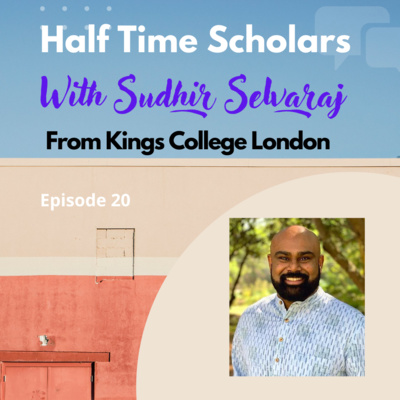
Half Time Scholars - Rethinking Violence: Religious Freedoms for Minorities in India
On this episode we speak with Sudhir Selvaraj of King’s College London about his research study looking at religious freedoms for minorities in India. Article 25 of the Indian Constitution provides for the 'Freedom of conscience and free profession, practice and propagation of religion'. However, in the recent past there has been an increase of violence against religious minorities.
Sudhir’s study adopts Norwegian political scientist Johan Galtung's framework which advocates for a broad conception of violence which includes direct, structural and cultural factors. Galtung also suggests a causal flow of violence from its cultural forms to its structural forms and finally to its direct forms. Sudhir’s study argues that both structural and physical violence are rooted in and justified using the Hindutva ideology which portrays Christians as "foreigners" intent on destroying the integrity of the Hindu nation through religious conversions.
Mainly, conversions are portrayed as a threat to the "Hindu State" in two ways. The first is its role in targeting "vulnerable" Hindu populations, particularly Dalits and Tribals. Secondly, conversions are presented as a tool of "foreigners" to influence India's politics. This broader conception of violence facilitates a challenge to existing notions that violence against Christians in the country began its proliferation in the late 1990s. Follow Sudhir’s work on Twitter @SudhirSelvaraj and also @ https://www.sudhirselvaraj.com/. Programming note: The Episode was recorded under available internet connection

Halftime Scholars - Through a Dark Glass, clearly: Ethical Consequences of Emerging Technologies
On this episode we explore how emerging technologies such as Artificial Intelligence offer great opportunities, but also pose existential threats to humanity and the natural world.
Our guest is Rebecca Johnson a PhD researcher from the University of Sydney, Faculty of Sciences. Rebecca’s work specifically looks at the ethics of artificial neural networks; the deep learning side of AI with a view to contribute to experts making better choices when deploying these new technologies into our world.
Tools such as AI have no capacity for a sense of morality and values, yet we increasingly permit artificial agents to make choices and decisions for us. From autonomous vehicles to recidivism risk algorithms, distribution of health care services to algorithmically adjusted school grades, hiring of new employees to management of non-renewable sources; we have given huge amounts of agency to our artificial agents.
Rebecca has long been fascinated by the interplay between humans and technology - sociotechnical systems. Sociotechnical systems (STS) approaches help us to better understand relationships between technologies, social structures, and the emergent phenomena that arise from those relationships.
Follow Rebecca’s fascinating work at @https://sts4ir.com/, or Twitter: @VoxBec

Halftime Scholars - Get up, Stand Up: Performativity and Resistance in Zimbabwean Stand-up Comedy
In this episode we speak with Dr Amanda Källstig who did her PhD in Politics at the University of Manchester, whose research explored what stand-up comedy in Zimbabwe can tell us about resistance and subjectivity. Amanda's research interests include comedy, postcolonial international relations theory, resistance, and subjectivity particularly in the context of the African continent.
Amanda’s research deals with what stand-up comedy in Zimbabwe can tell us about resistance and subjectivity. Through a fieldwork-based approach she looks at how stand-up comedy intervenes politically exploring how the genre interrupts the way both state and society constructs 'Zimbabwean-ness'. Follow Amanda’s work on twitter @DrKällstig. Amanda joined the Stockholm University in August 2021 as a lecturer in International Relations.

Halftime Scholars - Exploring the role of flexible education in supporting notions of self-fulfillment for women in Chennai, India
The study acknowledges the diversity of lived experiences and moves away from a homogenous collective representation of ‘women.' Further, education systems often legitimized certain aspirations and values over others, and also acted as instruments for gender regulation. Flexible education on the other hand is said to be learner-centered. Furthermore, the study explores the extent to which flexible education supports individual learners, particularly women, with respect to their idea of self-fulfillment.
Content Warning This episode contains content that may be alarming to some listeners. Mentions of violence against women. An acid attack incident and descriptions of its aftermath from 28min09sec to 31min50Ssec.

Halftime Scholars - The critical role of sources of efficacy information in a mandatory teacher professional development program: Implementation in a less privileged region of Indonesia.
Ria graduated from the School of Education of UNSW with the focus of study in teacher mandatory professional development programs in Indonesia's less privileged regions. Her research expands the current knowledge on teacher self-efficacy beliefs, in which her research model has proved that the construction of such beliefs which are highly influenced by the cultural and environmental contexts. Ria is a lecturer at the Masters of Pedagogy, Directorate of Postgraduate Program of Universitas Muhammadiyah Malang, Indonesia.
Episode Note - Please note this episode was recorded on available sound and internet quality.

Halftime Scholars - The Environmental Sublime, Nature as the Other.
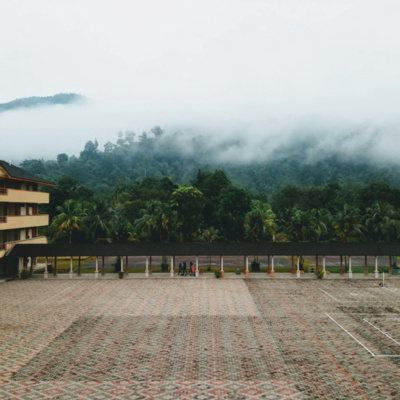
Halftime Scholars - Science for development, STEM education and rural young people’s aspirations: A comparative case study in Malaysia
Development’ discourse in the mainstream, is often defined in terms of economic growth that privileges modernity, urbanization, and scientific expertise. Across the Global South, this model has been internalized and reflected in a national focus on science—and recently STEM—education.
Our guest today is Aizuddin Anuar a researcher from the University of Oxford Department of Education specializing in Comparative and International Studies.
In this episode, we explore and focus on rural young people’s aspirations related to development, as they engage with (STEM) education as the state’s instrument for national development in Malaysia. Please follow Aizuddin’s work @aizuddin_anuar.

Halftime Scholars – Enrollment Change: Higher Education Policy and Transformation
In this episode, we examine how the Australian and Taiwan governments produced higher education enrolment policies between 2005 to 2009.
These policies transformed both country's higher education systems in an endeavor to meet the national priorities. My guest is Leo Ren-Hao Xu a researcher from the University of Sydney, Faculty of Arts and Social Sciences.
Their enrolment policies include the 2008 Bradley review and the Labor government’s response, 2009 Transforming Australia’s Higher Education System (colloquially called the demand-driven system), in Australia; and the 2009 Conditional Standards of Developmental Enrolment and Resources for Tertiary Education and the amended University Act of 2005, in Taiwan.
In an endeavor to meet the national priorities, both policies were shaped as a way of governing student enrolment through changing the quantity of government-supported university places within different areas of study. This study adopts Foucault’s concept of Governmentality and Bacchi’s ‘What’s the Problem Represented to be (WPR) to frame the understanding of how governmental interventions were produced in the specific political-cultural climates. This qualitative study employs semi-structured interviews (n=40) and policy document analysis. Data are primarily drawn from 19 interviews with senior politicians, policymakers, and university executives in Taiwan who engaged in the formation of selected policies between December 2019 and March 2020; and 21 equivalents in Australia from June to August 2020. Beyond these interviews, a considerable corpus of archival sources (e.g., policy documents and gazettes) was collected from the National Central Library of Taiwan and Parliamentary Library of Australia, and used in the analysis to support and complement the interview data.

Halftime Scholars - Sport Psychology, Mental Health Skills Training and Empowering Disadvantaged Youth
Grace Tidmarsh is a Researcher at the University of Birmingham, UK. The PhD is a collaborative project with St Basils’ housing support service for youth (16-25 years) experiencing homelessness.
Grace’s PhD research is part of a wider project in which a mental skills training programme (MST4Life) is delivered to service users. Outcomes from the programme include improved mental health, improved life skills and re-engagement in education, employment or training.
The research itself focusses on process evaluations to develop a deeper understanding of mechanisms that work or do not work with regards to 1. Delivering positive youth development programmes in complex community settings and 2. The extent to which it is possible to train front-line service staff to deliver these psychologically informed interventions with high fidelity.
The PhD includes a fidelity assessment of the delivery style of MST4Life, a systematic review on process evaluations of PYD programmes for disadvantaged youth, evaluation of young people’s feedback on the programme and finally a protocol of evaluating the fidelity of training delivered to frontline service staff.
Thank you for your support of Half Time Scholars.
Get in touch!
Instagram: @Halftime_Scholars
Twitter: @surenladd

Halftime Scholars - Cognitive and Motor learning for the Elderly
Motor sequence learning in the elderly is crucial to improve their motor function after serious health conditions such as strokes. Existing motor learning programmes neglect individual cognitive and motor differences, resulting in significantly varied improvements in motor function.
An EU-funded project aims to offer a management solution to the ageing demographic in the EU. It hopes to create an efficient method to provide a personalised approach to motor sequence learning in the elderly.
With goals to contribute to improving health management policies and future applications of advanced brain-computer interfaces.
On this episode, we speak to neuroscientist Dr Russell Chan from the University of Twente, who is one of the senior researchers apart of this project. Please follow Russell Chan's work @PrimeYourMind on Twitter.

Halftime Scholars - Respons-abilidad o la capacidad de responder. Response-able Spanish languaging practices: A social media discourse analysis in Australia
Over the past 30 years, shifts in language-in-education policies have resulted in the marginalisation and exclusion of world languages in the Australian education system. This has resulted in an English-for-all literacy mindset. These policy shifts have reduced access to world languages education in Australia. On this episode, we speak with Danielle Heinrichs from the Faculty of Education at the University of Queensland. Who draws on disciplines such as sociolinguistics, and critical theories to explore the notion of response-able language practices with relation to Spanish as a world language in the Australian education system?.. Please follow Danielle's work at @danielle_uq on Twitter.

Halftime Scholars-Conflict, Popular Photography, and its socio-political articulation in Sri Lanka.
Sri Lanka's experience of war and the tensions in its aftermath were actively narrated by way of photography. Since the 1980s, the island's visual identity has been framed as a paradise-under-siege. What does popular photography reveal about experiences of conflict and post-war political articulation? On this episode, we speak with Dr. Vindhya Buthpitiya, from the University College London, whose research explores popular photographic practices among members of the Northern Tamil community, by examining the relationship between photography, conflict, and the expression of political sentiments in the post-war context. Please follow Dr Buthpitiya at @vindib_ to learn more about her interesting work.

Halftime Scholars - 'Dar la Cara’: How the Colombian government communicated the peace process.
Colombia has a long complex history of conflict. The government of President Juan Manuel Santos signed a peace agreement in 2016 with the guerrilla group the Revolutionary Armed Forces of Colombia-People’s Army, which sought to end fifty years of war. The Santos government spent great efforts negotiating with the guerrilla group but failed to communicate the value of lasting peace to the Colombian people. On this episode, we talk with author, filmmaker and researcher Dr Gwen Burnyeat from the University College London on her ethnographic study of the Office of the High Commissioner for Peace, the government department responsible for peace negotiations and for explaining the peace process to the Colombian people. Dr Burnyeat has been been working on peace and conflict in Colombia for over a decade as both an engaged scholar and peacebuilding practitioner and is currently a Junior Research Fellow in Anthropology at the University of Oxford, please follow Gwen at @GwenBurnyeat to learn more about her interesting work.

Halftime Scholars - Applicability of Robotic and Autonomous Systems.
However, with the use of these Systems brings many opportunities and significant challenges, both in terms of ethical and practical issues within the military and non-military settings.
On this episode we discuss the public perceptions, challenges and vulnerabilities to the application of Robotic and Autonomous Systems with Bianca Torossian, a Strategic Analyst with the Hague Centre for Strategic Studies.
Bianca Torossian is a Strategic Analyst at HCSS. Her studies at The University of Sydney, Erasmus University Rotterdam, and Leiden University (The Hague), earned her a Bachelor degree in political science, political economy and sociology, and a Master degree in political science and international organization. At HCSS, Bianca primarily focusses on security and diplomacy. A specific area of interest is the field of technology and AI in defense contexts, which ties into a HCSS research project that critically analyzes the challenges and opportunities posed by robotic and autonomous systems in the military. She contributes to a range projects commissioned by the Dutch Ministries of Foreign Affairs and Defence.

Halftime Scholars - Challenging a sacrosanct tradition?
This episode discusses the utility of a critical approach to policy analysis as methodology for enquiry into the social production of mental health and illness. Situated within the complexities of work to depathologise trans, gender diverse, and non-binary people, this presentation offers a critical analysis of policies that guide healthcare practices for people seeking access to medical gender affirmations. It investigates representations of “care”, offering an overview of a comparative analysis of a policy whose proposed care-practices pivot around DSM-5 diagnostic criteria for “Gender Dysphoria”, and a policy proposing a non-pathologising, rights-based healthcare model for the provision of gender-related body modifications. On this episode our guest is Ms Rebecca Howe, a PhD Candidate from the University of Sydney, Faculty of Arts and Social Sciences.

Halftime Scholars - Hybrid Conflict: Neither war nor peace.
Her studies at The University of Sydney, Erasmus University Rotterdam, and Leiden University- The Hague, earned her a Bachelor degree political, economic and social science, and a Master degree in political science and international organization. She specializes in the intersection between emerging technologies and conflict.

Halftime Scholars- Indonesian Diaspora across the Celebes Sea: Citizenship, Negotiation and Identity
Whose research focuses on the dynamics of the Indonesian diaspora.
Who have been living for generations in the southern Philippines?
These communities have been officially recognised as (new) Indonesian citizens since December 2017.
This is the first time that the Indonesian government granted citizenship to a subpopulation in its diaspora.
Join us to listen to her insights as she embarks on her fieldwork.

Halftime Scholars- Community-based medical education in a post-disaster areas.
For years researchers have explored the long-term health impact of disasters, which can include anxiety, depression.
How do medical practitioners deal with potential problems related to patients in these specific conditions?
Greater awareness of these potential problems and solutions are vital for medical practitioners to work with patients from disaster-affected areas.
On this episode, we discuss these issues and solutions with Dr Rosaria Indah from The University of Sydney, join us today to listen to her insights from her ethnographic study researching medical education during fieldwork Aceh, Indonesia.

Halftime Scholars - on this episode we talk with Dr. Jeremy Cunningham.
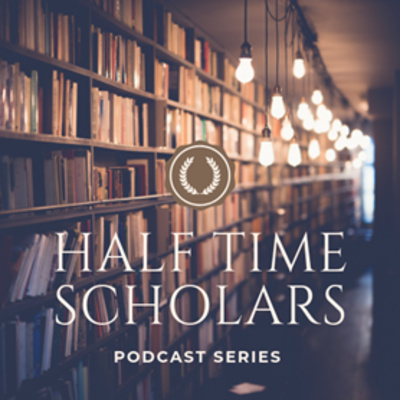
Halftime Scholars - Identifying global trends in screen-based behaviours of Children and Adolescents : An interview with scholar George Thomas.
Identifying global trends in screen-based behaviours of Children and Adolescents : An interview with scholar George Thomas.
Halftime Scholars is a podcast series which features the work of independent and emerging scholars to share their research and practice. Created by Suren Ladd, a PhD candidate in Education at the University of Sydney. In collaboration with series editor Miljiana Miljevic.
The views expressed by guests are their own and their appearance on the podcast series does not imply an endorsement of them or any entity they represent.